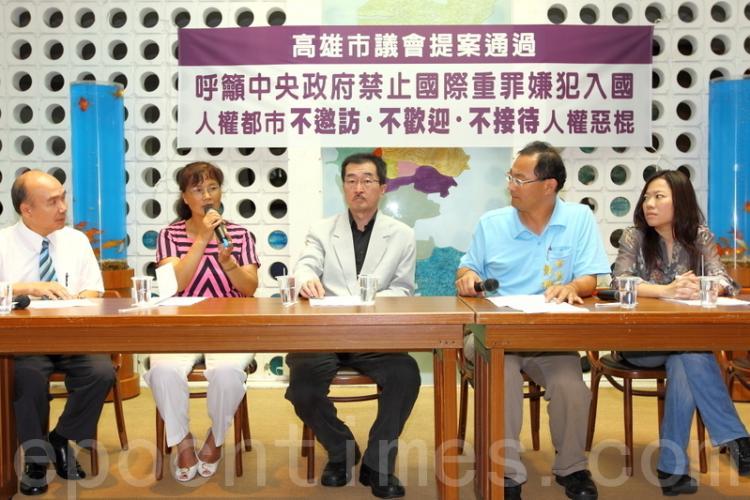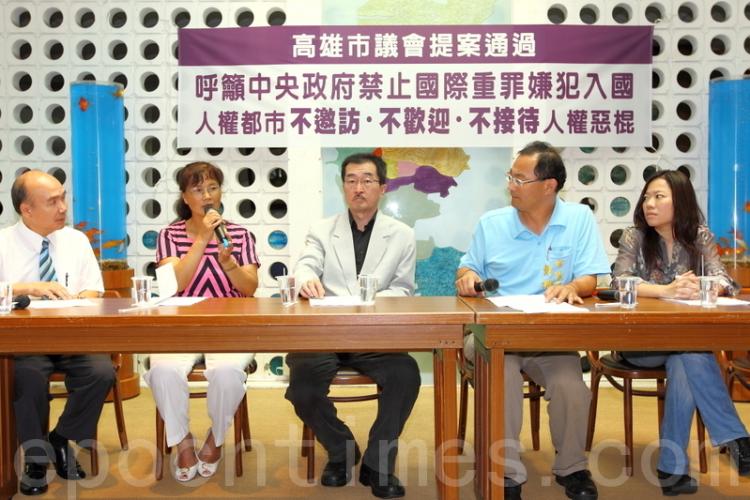KAOHSIUNG, Taiwan—The Kaohsiung City Council in southern Taiwan on Oct. 11 unanimously passed a resolution calling on the central government to ban human right abusers from entering Taiwan.
The resolution asks the city government of Kaohsiung, which is known as a human rights city, “not to invite, welcome or receive human rights scoundrels.” A press conference about the matter was held on Oct. 15 and received wide support by city councilors from both the ruling party and the opposition.
The resolution was passed one day after Taiwanese President Ma Ying-jeou stated publically that his administration would “pursue justice” and set up a human rights advisory committee under the Presidential Office during his National Day Rally Speech on Oct. 10.
In the sensitive political atmosphere during the run-up to the elections for special municipality mayors and city councilors in late November, city councilors from different parties tend to have differing views. The unanimous passing of this resolution by opposing political parties was, therefore, noteworthy.
Councilor Kang Yucheng, who introduced the bill to the city council, addressed one of the more headline-grabbing issues—the Chinese regime’s persecution of Falun Gong, which he said is “very serious”—but said the resolution is not only aimed at Chinese Communist Party officials guilty of those crimes; rather, he says, no human rights abusers are welcome to visit Kaohsiung City.
During the press conference Ms. Zheng Qimei, a Falun Dafa practitioner, pointed out that the hands of many high-ranking Chinese officials and the Chinese Communist Party’s leadership are “stained with blood.” She said it was unfortunate that Taiwanese officials gave them a high-profile reception when they visited, adding that the unsavory contradiction is embarrassing to many Taiwanese.
City Councilor Xiao Yongda said that China is using soft power tactics to wear Taiwan down, and, due to economic interests and the tourism industry, many people have remained silent.
City Councilor Chen Lina added that the Taiwanese government hasn’t fully perceived the seriousness of the matter, because it has placed importance on economic benefits before human rights concerns. She pointed out that the resolution is a good starting point.
“China is now the stage for the world’s economy, but it is also a savage land in terms of human rights,” said City Councilor Zhou Lingmin.
Zhou stated her support for what has become a common site when mainland tourists come to Taiwan: Falun Gong practitioners’ passing out flyers and telling them of the human rights abuses in China. “Only after visiting Taiwan can they really understand the human rights abuses taking place behind China’s economic development,” she said.
Read the original Chinese article.
The resolution asks the city government of Kaohsiung, which is known as a human rights city, “not to invite, welcome or receive human rights scoundrels.” A press conference about the matter was held on Oct. 15 and received wide support by city councilors from both the ruling party and the opposition.
The resolution was passed one day after Taiwanese President Ma Ying-jeou stated publically that his administration would “pursue justice” and set up a human rights advisory committee under the Presidential Office during his National Day Rally Speech on Oct. 10.
In the sensitive political atmosphere during the run-up to the elections for special municipality mayors and city councilors in late November, city councilors from different parties tend to have differing views. The unanimous passing of this resolution by opposing political parties was, therefore, noteworthy.
Councilor Kang Yucheng, who introduced the bill to the city council, addressed one of the more headline-grabbing issues—the Chinese regime’s persecution of Falun Gong, which he said is “very serious”—but said the resolution is not only aimed at Chinese Communist Party officials guilty of those crimes; rather, he says, no human rights abusers are welcome to visit Kaohsiung City.
During the press conference Ms. Zheng Qimei, a Falun Dafa practitioner, pointed out that the hands of many high-ranking Chinese officials and the Chinese Communist Party’s leadership are “stained with blood.” She said it was unfortunate that Taiwanese officials gave them a high-profile reception when they visited, adding that the unsavory contradiction is embarrassing to many Taiwanese.
City Councilor Xiao Yongda said that China is using soft power tactics to wear Taiwan down, and, due to economic interests and the tourism industry, many people have remained silent.
City Councilor Chen Lina added that the Taiwanese government hasn’t fully perceived the seriousness of the matter, because it has placed importance on economic benefits before human rights concerns. She pointed out that the resolution is a good starting point.
“China is now the stage for the world’s economy, but it is also a savage land in terms of human rights,” said City Councilor Zhou Lingmin.
Zhou stated her support for what has become a common site when mainland tourists come to Taiwan: Falun Gong practitioners’ passing out flyers and telling them of the human rights abuses in China. “Only after visiting Taiwan can they really understand the human rights abuses taking place behind China’s economic development,” she said.
Read the original Chinese article.



